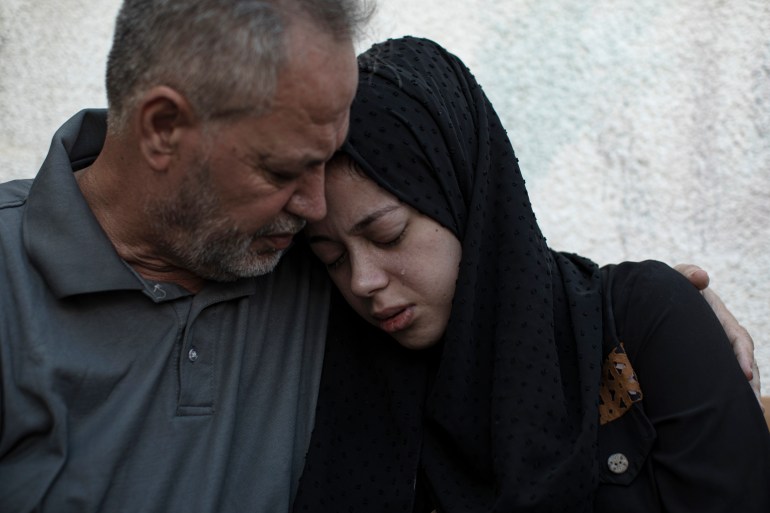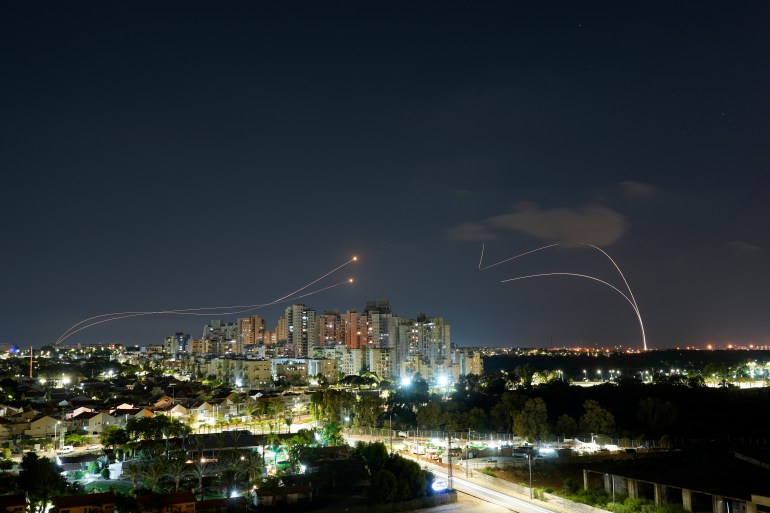Israel, Palestinian Islamic Jihad declare truce in Gaza
‘Fragile’ truce holds in Gaza after three days of Israeli bombardment that killed at least 44 Palestinians.

Israel and the Palestinian armed group Islamic Jihad have declared a truce, raising hopes of an end to three days of Israeli bombardment in Gaza that has killed at least 44 Palestinians, including 15 children.
The truce began at 11:30pm local time on Sunday (20:30 GMT) despite a flurry of Israeli air raids and Palestinian rocket attacks up until the last minute.
Keep reading
list of 4 itemsTimeline: Israel’s attacks on Gaza since 2005
The Gaza Strip explained in maps
‘Blood, body parts, screams’: Gaza reels after Israeli strikes
While both sides had agreed to halt the fighting, each has warned the other that it would respond with force to any violence.
“This ceasefire is holding,” said Al Jazeera’s Safwat al-Kahlout, reporting from Gaza City.
“Local government offices have announced they will reopen their doors for the public, while universities have also announced they will reopen for students. The municipality of Gaza and other municipalities have also announced they will send their equipment to remove the rubble and try to do an initial assessment of the destruction.”
Later on Monday, Gaza’s sole power plant restarted after fuel trucks passed from Israel into the Palestinian enclave. The facility had shutdown on Saturday, days after Israel’s closure of the goods crossing.
Israel on Friday launched its heavy bombardment of Gaza, flattening buildings and striking refugee camps across the territory. The Israeli military said it has been targeting members of the Islamic Jihad, including the group’s senior commanders, but according to Palestinian officials, almost half of the 44 people who died have been civilians.
At least 350 Palestinian civilians have also been wounded.
Islamic Jihad responded by firing hundreds of rockets into Israel, but most were intercepted or blown up. Israeli emergency services said three people in Israel were wounded by shrapnel, while 31 others were lightly hurt.
The fighting was the worst in Gaza since an 11-day war last year that killed at least 250 people in the impoverished coastal enclave and about 13 people in Israel.
Prisoner release
Sunday’s truce was mediated by Egypt, with help from the United Nations and Qatar. The secretary general of Islamic Jihad, Ziad al-Nakhala, said one of the key agreements was an Egyptian guarantee that it would work towards the release of two of the group’s leaders who are being held by Israel.
“The Islamic Jihad lays down its conditions. First, to unite all the Palestinians. Second, we demand that the enemy release our brother who has been on hunger strike, Khalil Awawda, and third, to release Sheikh Bassem al-Saadi,” al-Nakhala told reporters in the Iranian capital, Tehran.
Egypt issued a statement saying it is “exerting efforts to release” Awawda and “transfer him for treatment” and is working for the release of al-Saadi “as soon as possible”.
There was no immediate comment from Israel.
Al-Saadi’s arrest last week in the occupied West Bank was one of the key triggers of the latest escalation. Following his arrest, Israeli forces launched what they called “pre-emptive” raids on the Gaza Strip to prevent any retaliatory attacks. Islamic Jihad’s commanders, Taysir al-Jabari and Khaled Mansour, were killed in attacks on Friday and Saturday, respectively.
Israeli forces also arrested 19 more members of the Islamic Jihad in the occupied West Bank.
“As far as Israel is concerned, this operation is over, ” said Al Jazeera’s Natasha Ghoneim, reporting from West Jerusalem. “For the Israelis, the objective was to neutralize Islamic Jihad, with most, if not all senior leadership being killed as well.”
Ghoneim said the Israelis have also created a divide between Islamic Jihad and Hamas, the larger group that governs the Gaza Strip. Hamas has fought four wars with Israel since taking control of the enclave in 2007.
“There was a concern that if this operation was protracted and the death toll continued to rise, that perhaps Hamas might enter the fray. It appears for now that has not happened, with Hamas remaining on the sidelines,” Ghoneim said.


‘We haven’t slept for days’
In Gaza, news of the truce brought dozens of people to the streets in celebration. One resident, Nour Abu Sultan, told the AFP news agency earlier in the day that she was awaiting the declaration of the truce on “tenterhooks”.
“We haven’t slept for days [due to] heat and shelling and rockets, the sound of aircraft hovering above us … is terrifying,” the 29-year-old said.
The United States and the UN also welcomed the truce.
US President Joe Biden thanked his Egyptian counterpart, Abdel Fattah el-Sisi, for his country’s role in brokering the ceasefire, and called for investigations into civilian casualties, which he called a “tragedy”.
UN Middle East Envoy Tor Wennesland underscored his commitment to “do all we can” towards ending the escalation, ensuring the safety of the civilian population, and “following up on the Palestinian prisoner file”.
“The situation is still very fragile,” he said in a tweet. “I urge all parties to observe the ceasefire.”
2/2 … The situation is still very fragile, and I urge all parties to observe the ceasefire.
— Tor Wennesland (@TWennesland) August 7, 2022
Despite the halt to the fighting, Palestinians in Gaza said they cannot live normal lives because of Israel’s 15-year siege.
Approximately 2.3 million people are packed into the narrow coastal enclave, with Israel and Egypt tightly restricting the movement of people and goods in and out of the enclave and imposing a naval blockade, citing security concerns.
“People in Gaza don’t get to go back to anything like normal because they are still living under Israel’s siege that is a form of silent violence against every man, woman and child in Gaza, 24 hours a day, 365 days a year, for 15 years,” said Ali Abunimah, the director of The Electronic Intifada, a website that focuses on Palestinians under occupation.
“So unfortunately, it is fragile. This is going to happen again. I can’t tell you if its going to be in a day, or a week, a month or a year. But it’s going to keep happening because Israel enjoys total impunity for its crimes against the Palestinian people, and not just impunity, but full and active support. Remember it was bombing Gaza with weapons provided by the US, EU and Canada, who all stood by Israel.”
He added: “And these are the same countries that are sending billions of dollars to Ukraine supposedly to resist occupation and invasion, but here they are helping Israel perpetrate occupation, invasion and terror against a civilian population.”